|
Among the Blue Men
Travel and Ritual with a Tuareg Nomadic Tribe in Mali
Article and photos by James Michael Dorsey
|
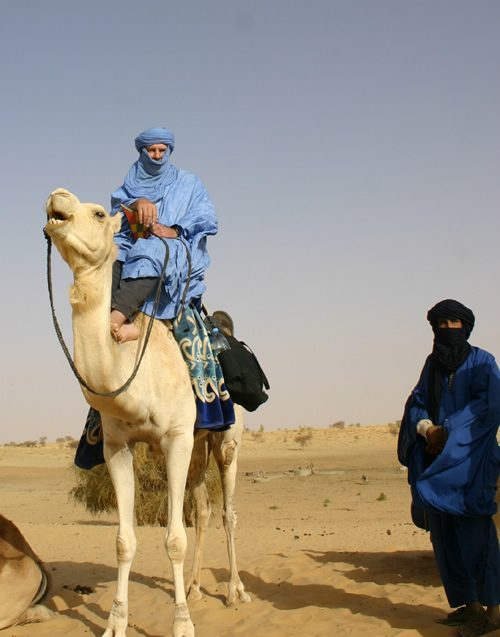
|
|
Author mounted on a camel in the Sahara Desert with a member of the Tuaregs.
|
Standing in the morning sunshine of Timbuktu, wearing blue robes and a turban, I ask myself, "What have I done?"
Three months earlier a friend had told me of a Tuareg, one of the famed Blue Men of the Sahara who might take me into the desert of Mali. Now, three armed warriors on camel back sit outside my hotel, waiting for me.
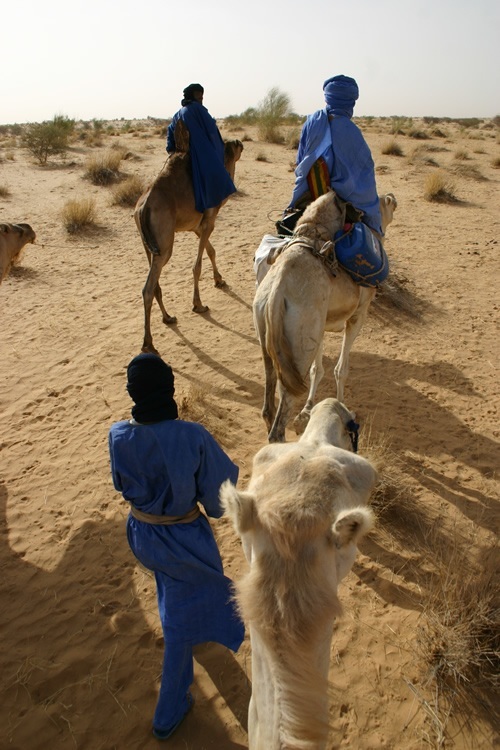
|
|
Riding with the "Blue Men."
|
The first written reference to the Tuaregs comes from the Greek Historian Herodotus, around 450 B.C., who believed them to have originated in either Egypt or Libya centuries before Christ. He called them Canaanites, which translates roughly into “Purple people.”
The Tuaregs are a Berber ethnic group, whose numbers today approaches one million; they are widely spread throughout Niger, Mali, Algeria, Burkina Faso, and Libya, with smaller numbers in Morocco. These traditional nomads owe allegiance to no particular country, and consider the Sahara their true home. They have a different name for the desert in each of the countries it spans. The nomads see what only the west calls the "Sahara Desert" as many separate deserts.
The term “Tuareg” is derived from the area in their assumed ancestral home in Libya called Fezzan Targa, combined with a misinterpretation of the Arabic root TRQ, having a colloquial meaning of “Abandoned by God,” a term they have applied to themselves after losing much of their traditional desert homelands due to foreign conquest. They refer to themselves most commonly as Kel Tamasheq, or “Those who speak Tamasheq,” their native tongue, and also Kel Tagelmoust, or “Wearers of the veil.” In Mali, the majority also speak Arabic and French. For two thousand years, their caravans have hauled gold, salt, and even slaves from North Africa to the great port cities such as Mopti and Dakar.
Most people know them as the “Blue Men” because of their deep indigo robes and turbans, called tagelmoust. The color is gleaned from the ink of sea urchins imported from the Mediterranean. The women dry the ink in the sun and beat it into a powder, after which it is worked by hand into the fabric, giving it the deep, rich, color. Indigo is absorbed through the pores of the skin, and those who wear it often eventually take on a permanent blue tint — thus their name.
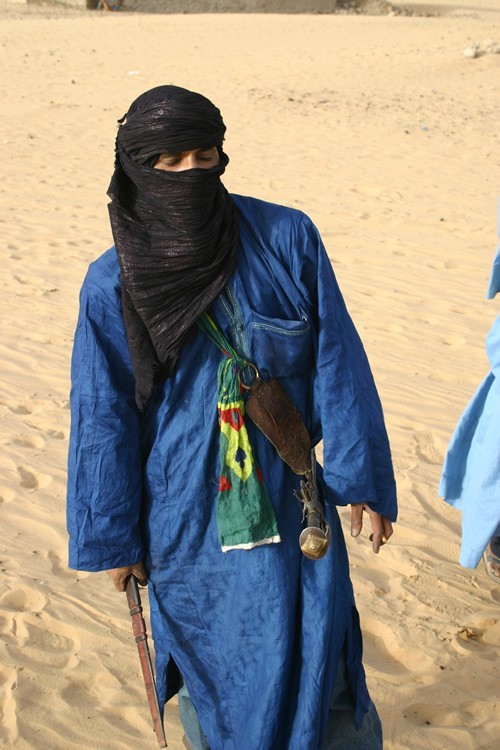
|
|
Tuareg with sword and knife in the Sahara Desert.
|
After introductions, Halis shows me how to mount my kneeling camel, climbing up his forelegs and over the peaked saddle guard. With him and two other Tuaregs, we slowly ride north 100 miles to their village at Arawan. For two weeks I will hear no mechanical sounds.
Navigation is through an inbred sense known only to nomads. When we stop, they have a fire going in seconds using flint and steel amid the endless hot winds known as the Harmattan. Halis makes the first of many cups of sugar-laden tea they imbibe throughout the day, while his brother has captured and plucked a mourning dove that is sizzling on a wooden skewer. At night we sleep in the warm sand wrapped only in our long robes, next to our tethered camels, secure in the knowledge that bandits and brigands fear Tuaregs and will not attack us.
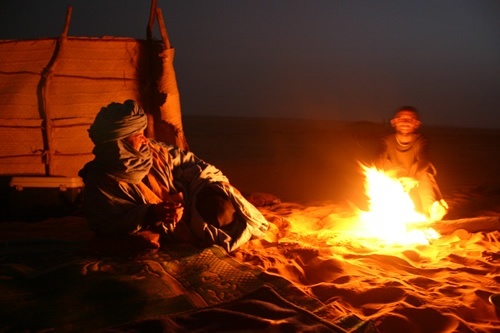
|
|
Campfire in the in the Sahara Desert.
|
On the fifth day we reach Arawan, a former Foreign Legion outpost until Mali won its independence in 1964. This scattering of crumbling mud brick rooms is now home to Halis’ family and the last watering stop for the southbound caravans on the journey back to Timbuktu. The head of the clan greets me and says I honor him by wanting to enter their society, then leads me by the arm over a dune to a scene as described directly in the Bible.
Hundreds of camels kneel in the sand, each carrying four flat salt blocks cut from the northern mines near Mauritania. The blocks weigh 200 pounds each and are hung by rope, two on each side. In parts of West Africa salt is still used as money. The camel will carry this weight 40 miles a day and drink water once a week, consuming 100 gallons in ten minutes. The camel drovers offer me water from a pigskin bag.
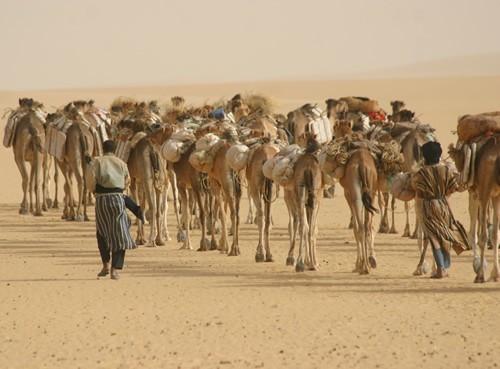
|
|
Camels hauling salt in the Sahara Desert.
|
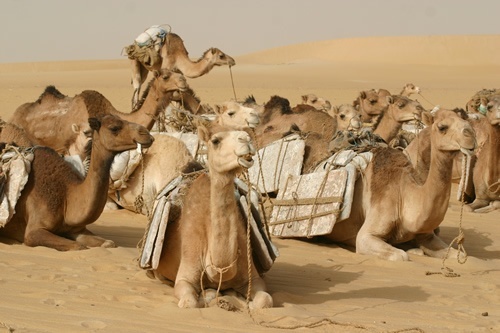
|
|
Camels resting.
|
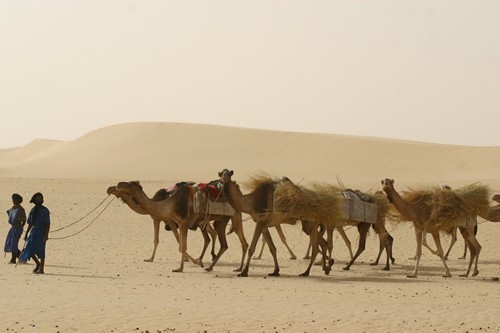
|
|
Tuareg drovers in the desert leading the camels in the Sahara Desert.
|
At sunset, in a courtyard of the village, the women make a fire to sear goat and serve rice. I consume my tenth cup of sugar tea. They smile demurely but avoid eye contact with me. I can only talk to or be alone with one of them if I wish to buy something, since in this society they are the moneychangers. Tuareg women are treated with great respect and as equals to men.
We gather inside a cozy yurt that the women assemble and break down each time the clan moves. We sit cross-legged in a circle in the sand, many of the men wearing daggers in their waist sashes. The women serve the goat and rice on a large round plate. Then they disappear. By custom they will eat when the men are finished. We eat with only our right hands, as according to Islamic tradition the left is for cleaning oneself. My dining companions wipe their hands on their robes, while loud burps and belches signal a meal well enjoyed. After dinner, ancient stories of battles fought are translated for me by Halis.
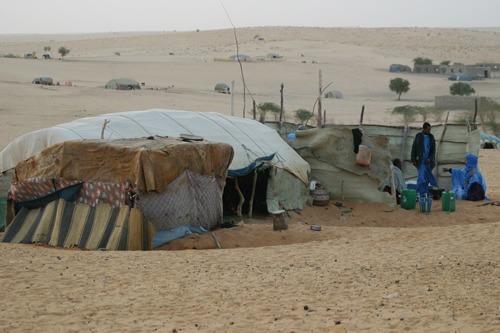
|
|
A Tuareg yurt.
|
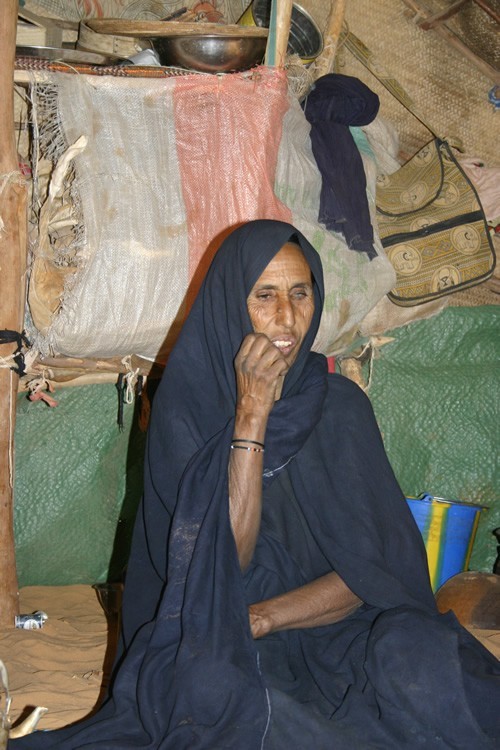
|
|
A woman in the Yurt.
|
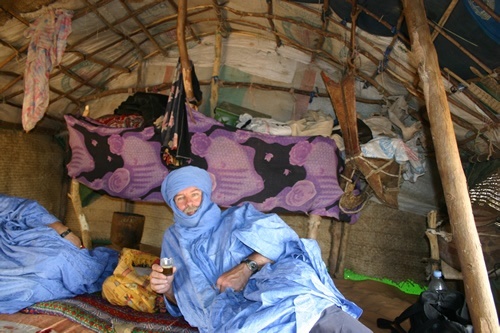
|
|
Author taking tea in a Yurt.
|
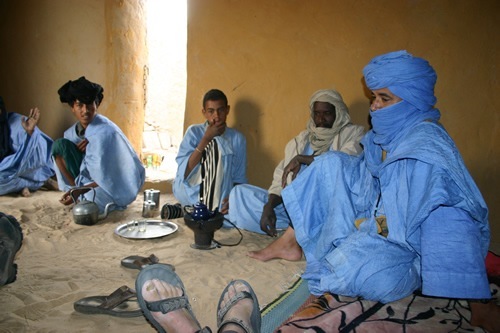
|
|
With the Blue Men of the Sahara.
|
Tuaregs navigate not only using the sun and stars as guides, but also the shifting of the sand dunes, and the feel of the wind on their skin. They can follow a track in the sand long after it has vanished. Tuaregs care for their camels like a family member, since in the desert they are as necessary as water. The nomads, these "blue men," say they do not always know where they are, but are never lost.
Though primarily Muslim, their beliefs are filtered through desert superstition as well as a residual dose of Judaism derived from merchants who centuries ago controlled North African trade. Tuaregs will not occupy a yurt where someone has died, and will hold exorcisms if they believe a spirit has assumed power. The group is unusual in Islam in that the men cover their faces, believing evil spirits enter the body through facial orifices, while the women go uncovered. A veiling ceremony at age 18 is a rite of passage from boyhood to manhood.
Since my time with Tuaregs, an invasion of Mali by one of the branches armed extremist groups has dispersed many of them across several countries. Exploration by large oil companies also threatens their ancestral homelands with a rapidly developing modern infrastructure.
The Tuareg nomads opened their world to me without reservation. I was welcomed to ride as one of them for 200 miles, and to visit several of their camps. When I left they gave me a medallion that requests safe passage for me should I ever return to their domain.
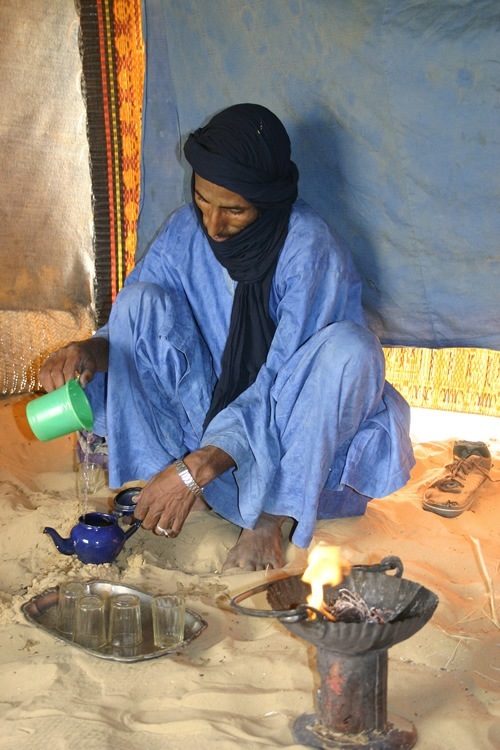
|
|
Making tea, a daily ritual among a hospitable people.
|
Sometimes the easiest way to learn about another culture is simply to ask.
James Michael Dorsey is an explorer, award winning author, photographer, and lecturer. He has traveled extensively in 45 countries, mostly far off the beaten path. His main pursuit is visiting remote tribal cultures in Asia and Africa.
|
